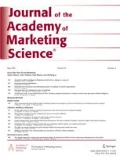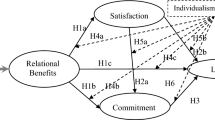Abstract
Few, if any, past studies have attempted to develop a model to capture and explain industry context variability and hypothesize its effects on consumer-firm relationships. Generally, industry effects are ignored, described, or explained post hoc. Using the notion of consumers' dispositions toward a market, a framework is proposed for understanding the influence of industry context on consumer satisfaction, trust, value, and loyalty in relational exchanges. The empirical results of a survey in two service industries show that industry contexts matter and yield significant direct and moderating effects on consumer-firm relationships. The study underscores the promise of a dispositional approach for providing insights for the theory and practice of relationship marketing, resolvin goutstanding questions, and proposing fruitful areas for further examination.
Similar content being viewed by others
References
Aiken, L. S. and S. G. West. 1991.Multiple Regression: Testing and Interpreting Interactions. Newbury Park, CA: Sage.
Allison, Neil K. 1978. “A Psychometric Development Test for Consumer Alienation From the Marketplace.”Journal of Marketing Research 15 (November): 566–575.
Anderson, Eugene W. 1994. “Cross Category Variation in Customer Satisfaction and Retention.”Marketing Letters 5 (1): 19–30.
Armstrong, J. Scott and Terry S. Overton. 1977. “Estimating Nonresponse Bias in Mail Surveys.”Journal of Marketing Researh 14 (August): 396–402.
Barksdale, Hiram C., and William R. Darden. 1972. “Consumer Attitudes Toward Marketing and Consumerism.”Journal of Marketing 36 (October): 28–35.
Davis-Blake, A. and Jerry Pfeffer. 1989. “Just a Ratrace: The Search for Dispositional Effects in Organizational Research.”Academy of Management Review 14: 385–400.
Doney, Patricia M. and Joseph P. Cannon. 1978. “An Examination of the Nature of Trust in Buyer-Seller Relationships.”Journal of Marketing 61 (April): 35–51.
Fazio, Russell H. and Mark P. Zanna. 1978. “On the Predictive Validity of Attitudes: The Roles of Direct Experience and Confidence.”Journal of Personality 46: 228–243.
Fein, Steven. 1996. “Effects of Suspicion on Attributional Thinking and the Correspondence Bias.”Journal of Personality and Social Psychology 70 (6): 1164–1184.
Fornell, Claes, Michael D. Johnson, Eugene W. Anderson, Jaesung Cha, and Barbera Everitt Bryant. 1996. “The American Customer Satisfaction Index: Nature, Purpose and Findings.”Journal of Marketing 60 (October): 7–18.
— and David V. Larcker. 1981. “Evaluating Structure Equations Models With Unobservable Variables and Measurement Error.”Journal of Marketing Research 18 (February): 39–50.
Friestad, Marian and Peter Wright. 1995. “The Persuasion Knowledge Model: How People Cope With Persuasion Attempts.”Journal of Consumer Research 21 (June): 1–30.
Garbarino, Ellen and Mark Johnson. 1999. “The Different Roles of Satisfaction, Trust and Commitment for Relational and Transactional Consumers.”Journal of Marketing 63 (April): 70–87.
Gaski, John and Michael Etzel. 1986. “The Index of Consumer Sentiment Toward Marketing.”Journal of Marketing 50 (July): 71–81.
Grisaffe, Douglas P. and Anand Kumar. 1998. “Antecedents and Consequences of Customer Value: Testing an Expanded Framework.” Working Paper 98-107. Marketing Science Institute, Cambridge, MA.
Hirschman, Albert O. 1970.Exit, Voice, and Loyalty. Cambridge, MA: Harvard University Press.
Hui, Michael K. and John N. Bateson. 1991. “Perceived Control and the Effects of Crowding and Consumer Choice in the Service Environment.”Journal of Consumer Research 18 (September): 174–184.
Iacobucci, Dawn, and Amy Oström. 1996. “Commercial and Interpersonal Relationships: Using the Structure of Interpersonal Relationships to Understand Individual-to-Individual, Individual-to-Firm, and Firm-to-Firm Relationships in Commerce.”International Journal of Research in Marketing 13: 53–72.
Johnson, Michael D. and Seigyoung Auh. 1998. “Customer Satisfaction, Loyalty, and the Trust Environment.”Advances in Consumer Research 25: 15–20.
Jones, Thomas O. and W. Earl Sasser Jr. 1995. “Why Satisfied Customers Defect.”Harvard Business Review 73 (6): 88–99.
Lambert, Zarrel V. 1980. “Consumer Alienation, General Dissatisfaction and Consumerism Issues.”Journal of Retailing 56 (Summer): 3–24.
Lind, E. Allen and Tom R. Tyler. 1988.The Social Psychology of Procedural Justice. New York: Plenum.
Lundstrom, W. J. and Lawrence M. Lamont. 1976. “The Development of a Scale to Measure Consumer Discontent.”Journal of Marketing Research 13 (November): 373–381.
Mischel, Walter and Yuichi Shoda. 1999. “Integrating Dispositions and Processing Dynamics Within a Unified Theory of Personality: The Cognitive-Affective Personality System.” InHandbook of Personality, Theory and Research, 2nd ed. Eds. Lawerence A. Pervin and Oliver P. John. New York: Guilford.
Mittal, Vikas and Wagner A. Kamakura. 2001. “Satisfaction, Repurchase Intent, and Repurchase Behavior: Investigating the Moderating Effect of Customer Characteristics.”Journal of Marketing Research 38 (February): 131–142.
Morgan, Robert M. and Shelby D. Hunt. 1994. “The Commitment-Trust Theory of Relationship Marketing.”Journal of Marketing 58 (July): 20–38.
Myers-Levy, Joan and Alice M. Tybout. 1989. “Schema Congruity as a Basis for Product Evaluation.”Journal of Consumer Research 16 (June): 39–54.
Neal, William D. 1999. “Satisfaction Is Nice, but Value Drives Loyalty.”Marketing Research 11 (Spring): 20–24.
Oliver, Richard. 1997.Satisfaction: A Behavioral Perspective on the Consumer. New York: Irwin/McGraw-Hill.
—. 1999. “Whence Consumer Loyalty.”Journal of Marketing 63 (Special Issue): 33–44.
Oström, Amy and Dawn Iacobucci. 1995. “Consumer Trade-Offs and the Evaluation of Services.”Journal of Marketing 59 (January): 17–28.
Otnes, Cele, Tina M. Lowrey, and L. J. Shrum. 1997. “Toward an Understanding of Consumer Ambivalence.”Journal of Consumer Research 24 (June): 80–93.
Rosa, José Antonio, Joseph F. Porac, Jelena Runser-Spanjol, and Michael S. Saxon. 1999. “Sociocognitive Dynamics in a Product Market.”Journal of Marketing 63 (Special Issue): 64–77.
Rosch, Eleanor and Carolyn B. Mervis. 1975. “Family Resemblances: Studies in the Internal Structure of Categories.”Cognitive Psychology 7 (October): 573–605.
Singh, Jagdip. 1991. “Industry Characteristics and Consumer Dissatisfaction.”Journal of Consumer Affairs 25 (1): 19–56.
— and Deepak Sirdeshmukh. 2000. “Agency and Trust Mechanisms in Consumer Satisfaction and Loyalty Judgements.”Journal of the Academy of Marketing Science 28 (Winter): 150–167.
Sirdeshmukh Deepak, Jagdip Singh, and Barry Sabol. 2002. “Impact of Frontline Employee Behaviors and Management Practices on Consumer Trust, Value and Loyalty in Relational Service Exchanges.”Journal of Marketing 66 (January): 15–37.
Smith, Brock J. and Donald W. Barclay. 1997. “The Effects of Organizational Differences and Trust on the Effectiveness of Selling Partner Relationships.”Journal of Marketing 61 (January): 3–21.
Srinivasan, Narasimhan and Brian T. Ratchford. 1991. “An Empirical Test of a Model of External Search for Automobiles.”Journal of Consumer Research 18 (September): 233–242.
Steenkamp, Jan-Benedict E. M., Frenkel ter Hofstede, and Michel Wedel. 1999. “A Cross-National Investigation Into the Individual and National Cultural Antecedents of Consumer Innovativeness.”Journal of Marketing 63 (April): 55–69.
Tax, Stephen S., Stephen W. Brown, and Murali Chandrashekaran. 1998. “Customer Evaluations of Service Complaint Experiences: Implications for Relationship Marketing.”Journal of Marketing 62 (April): 60–76.
Wish, Myron, Morton Deutsch, and Susan J. Kaplan. 1976. “Perceived Dimensions of Interpersonal Relations.”Journal of Personality and Social Psychology 33 (4): 409–420.
Zeithaml, V. A., L. L. Berry, and A. Parasuraman. 1996. “The Behavioral Consequences of Service Quality.”Journal of Marketing 60 (April): 31–46.
Author information
Authors and Affiliations
Additional information
Edwin Nijssen, Ph.D., is a professor of marketing at the Nijmegen School of Management at the University of Nijmegen, the Netherlands. His research interest focuses on strategic and international marketing issues, relationship marketing, brand management, and new-product development. He has published inLong Range Planning, theJournal of Product Innovation Management, Technology Forecasting and Social Change, R&D Management, Industrial Marketing Management, and theJournal of International Marketing and has written several books on marketing strategy.
Jagdip Singh, Ph.D., is a professor of marketing at the Weatherhead School of Management at Case Western Reserve University. His primary areas of research include consumer dissatisfaction and trust, measurement issues—including relationships between theoretical concepts and empirical observations— and the effectiveness of boundary role personnel. He has published in theJournal of Marketing, theAcademy of Management Journal, theJournal of the Academy of Marketing Science, Behavioral Research in Accounting, andManagement Science, among others.
Deepak Sirdeshmukh, Ph.D., is a visiting assistant professor of marketing at the Weatherhead School of Management at Case Western Reserve University. His primary areas of research include consumer trust and consumer processing of brand information. He has published in theJournal of Marketing, theJournal of Marketing Research, theJournal of Consumer Research, theJournal of the Academy of Marketing Science, and theJournal of Consumer Psychology, among others.
Hartmut H. Holzmüeller, Ph.D., is a professor of marketing at the School of Business at Dortmund University, Germany. His research interests include cross-national consumer research and customer relationship marketing. Most of his work has been published in German. His articles also appeared in theJournal of International Marketing, Management International Review, andInternational Business Review.
Rights and permissions
About this article
Cite this article
Nijssen, E., Singh, J., Sirdeshmukh, D. et al. Investigating industry context effects in consumer-firm relationships: Preliminary results from a dispositional approach. J. of the Acad. Mark. Sci. 31, 46–60 (2003). https://doi.org/10.1177/0092070302238604
Issue Date:
DOI: https://doi.org/10.1177/0092070302238604




